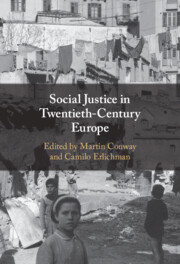Book contents
- Social Justice in Twentieth-Century Europe
- Social Justice in Twentieth-Century Europe
- Copyright page
- Contents
- Contributors
- Acknowledgements
- 1 Social Justice
- 2 Social Justice within a Market Society
- 3 Catholic Conceptions of Social Justice from 1891 to Pope Francis
- 4 Social Justice through Taxation?
- 5 A Fascist Social Justice?
- 6 Social Justice in Authoritarian Central Europe
- 7 Social Justice in a Socialist Society
- 8 Immigrants and Social Justice in Western Europe since the 1960s
- 9 Reimagining Peace through Social Justice in Mid- to Late Twentieth-Century Europe
- 10 Social Justice or Sexual Justice?
- 11 Equity Rules
- 12 Bridging the Void
- 13 Postscript
- Index
8 - Immigrants and Social Justice in Western Europe since the 1960s
Published online by Cambridge University Press: 29 February 2024
- Social Justice in Twentieth-Century Europe
- Social Justice in Twentieth-Century Europe
- Copyright page
- Contents
- Contributors
- Acknowledgements
- 1 Social Justice
- 2 Social Justice within a Market Society
- 3 Catholic Conceptions of Social Justice from 1891 to Pope Francis
- 4 Social Justice through Taxation?
- 5 A Fascist Social Justice?
- 6 Social Justice in Authoritarian Central Europe
- 7 Social Justice in a Socialist Society
- 8 Immigrants and Social Justice in Western Europe since the 1960s
- 9 Reimagining Peace through Social Justice in Mid- to Late Twentieth-Century Europe
- 10 Social Justice or Sexual Justice?
- 11 Equity Rules
- 12 Bridging the Void
- 13 Postscript
- Index
Summary
This chapter seeks to explain one element of inequality in Western Europe by focusing on the treatment of immigrant communities. It focuses on how attitudes to immigrants – and conceptions of them within a broader framework of social justice – evolved. One of the ways that the ‘long 1968’ challenged European complacency was to present the cause of immigrants as a cause of social justice. By contrast, today immigrants are often depicted as antithetical to social justice. Many commentators have argued that a fundamental tension exists between ethnic diversity and social equality, and depict mass migration as undermining social justice. But where did such ‘welfare chauvinism’ originate from, and how did these ideas entrench themselves within public discourse? In other words, how did we get from social justice for immigrants to immigrants as the antithesis of social justice? A conventional answer to this question might focus on the loss of confidence of left-wing political projects towards the end of the twentieth century, and the concomitant rise of the radical right. This chapter, however, interrogates tensions within social-justice discourses of the left and centre-left, paying attention to emancipatory and exclusionary aspects, and drawing links between the ‘guest worker’ era and the present day.
Keywords
- Type
- Chapter
- Information
- Social Justice in Twentieth-Century Europe , pp. 163 - 184Publisher: Cambridge University PressPrint publication year: 2024

